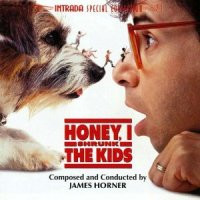- Composed by James Horner
- Intrada / 2009 / 51:10
One of the last of that group of great family adventure movies that so entertained people of my generation during the 1980s – and bring back such warm-hearted nostalgic tinges today – Joe Johnston’s Honey, I Shrunk the Kids followed in the footsteps of The Goonies and Gremlins and all the others with its mix of comedy, adventure and (for pre-teens!) a few scares. After a “mad scientist” accidentally shrinks his children to thimble-size, they face all sorts of adventures while the grown-ups try to find them and return them to their usual dimensions.
This was Johnston’s first film as director and marked the beginning of a very successful run of collaborations with composer James Horner (sadly now apparently ended – how wonderful it would be to find Horner scoring the director’s forthcoming Captain America, but I don’t suppose it will happen). Horner was riding the crest of a wave at the time, not quite scoring the “prestige projects” which would follow in the 1990s, but firmly established in the A-list of film composers. But he had already been the subject of controversy (for reasons which surely don’t need repeating once more) – and that was as nothing compared with what happened when this film got released. Disney was sued by the estates of two separate composers over the uncredited use of their music in this film’s score – Raymond Scott for his famous Powerhouse theme, and Nino Rota for Amacord. Neither case seems to have actually reached court, but details are sketchy – and unurprisingly (though disappointingly) not mentioned in this Disney-sanctioned, Horner-produced album’s liner notes. They’re pretty blatant lifts, but if truth be told the same thing happens in film music all the time, and Danny Elfman had previously used Rota’s Amacord in much the same uncredited fashion in Pee Wee’s Big Adventure, which doesn’t seem to have got anyone sued.
Putting aside that controversy, you’re left with a wonderful film score. These days Horner concentrates almost exclusively on serious films, to the extent that it can come as quite a surprise to hear his older works and remember what happy-go-lucky music he used to write so frequently. Honey, I Shrunk the Kids features so much lighthearted – but beautifully, painstakingly-drawn – music, it’s an absolute delight. The main title theme is of course entirely derivative – but still completely infectious. Horner fills the piece with so much energy and fits it into strategic moments in the score with such conviction, it’s actually quite easy to forget that it’s not really his own – fans of this particular composer have had plenty long enough by now to decide whether or not they’re going to be bothered by this sort of thing, so I don’t think I need add any more about it.
Entirely Horner’s own are the two other sides to the score. The rambuntious action music – first heard in “Shrunk”, and in several places later on – is simply brilliant. No doubt some will snobbishly dismiss it as Mickey Mouse music (well, this is a Disney film!) but it takes such a talented composer to pull this sort of thing off – to write wild, madcap, schizophrenic music like this and keep it so very listenable. Horner very rarely ventures into this territory any more (moments of the two Zorro scores, I guess) but – to perhaps attract a little controversy myself – I don’t think any other film composer, past or present, has managed to do Mickey-Mousing in such an unbreakablymusical way. Horner has always favoured through-composing, and long cues; that he can even do it in this type of score is bordering on the miraculous. Sometimes there’s a large dose of humour injected into the music (eg “Ant Rodeo”) and even then, Horner keeps everything entirely listenable.
The other main idea (though far less prominent) is the touching music associated with the children’s more tender moments, like “Night Time”, which features a really beautiful melody. This composer can pull those out at the drop of a hat, so it’s no great surprise – but finding it buried within this boistrous score probably turns it into an even greater treasure. It receives a gleefully warm rendition in the finale, too (“Thanksgiving Dinner”). Horner keeps all these disparate elements bound together very tightly, and the album plays out very well.
Speaking of the album, Intrada’s new 2009 release is, amazingly, the first time the score has been available on CD. There has frequently been speculation that the legal troubles may have been the cause of this, but whatever the case, Intrada’s new-found relationship with Disney has made this release possible, and it sounds fantastic, with stellar sonics. And what a score – it has to lose a mark because of the borrowings, but otherwise it’s just a huge treat from start to finish. The kids may be small – but the music is HUGE! ****













Great fun! But one thing I was a bit peeved with was the presence of Horner’s “Chimp Rumble” theme from Project X. It works perfectly though. My guess is half of Horner’s lifting comes from paying too much attention to temp tracks